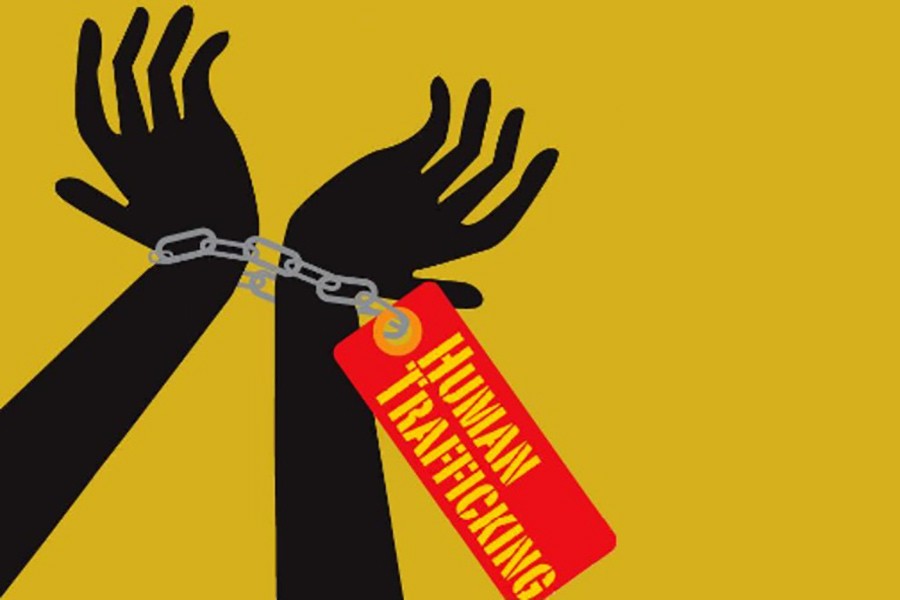Unresolved human trafficking cases remain concerning in Bangladesh in H1 2025

Published :
Updated :

The number of unresolved human- trafficking cases remained at a concerning level in Bangladesh in the first half of 2025, as ongoing investigations and court proceedings continue to delay justice for victims. While data shows a steady increase in the resolution of human trafficking cases, with several cases reaching judicial conclusions, the backlog of unresolved cases remains an issue.
According to a recent government report on Human Trafficking Cases (January - June 2025), a total of 605 human trafficking cases were registered across the country from January to June 2025. Of these, 386 cases were resolved, including charge sheets and final reports.
These cases, which involve crimes ranging from forced labour to sexual exploitation, have been under active review by courts and law enforcement agencies.
As of June 2025, the total number of human trafficking cases stood at 1,590. However, the number of cases still under investigation remains 1,529.
Including previously filed cases, the total number of cases under investigation or jurisdiction amounts to 3,128, involving a total of 42,056 accused individuals, of whom 16,931 have been arrested.
Over the last six months, only 28 individuals have been convicted, with 9 cases resulting in convictions over different periods, including sentences for life imprisonment. However, no individual has been convicted with a death sentence as of yet.
On Thursday, UN Migration Bangladesh launched the Bench Book for the Judiciary on Effective Criminal Justice Responses to Human Trafficking Cases, which highlighted challenges in reporting human trafficking cases in Bangladesh.
"Victims often lack knowledge of trafficking crimes and may report related issues like sexual violence or exploitation without recognising they are victims of trafficking. In cases of gender-based violence, victims may not recognise their status due to normalisation of the abuse."
Traffickers often instruct victims not to report, using fear of prosecution for involvement in illegal activities to prevent them from seeking help. This enables traffickers to evade liability, while victims are often mistaken for irregular migrants and prosecuted under immigration laws.
The 2023 U.S. TIP Report pointed out a failure to identify domestic trafficking cases for sexual exploitation and noted the lack of clear legal reporting mechanisms in refugee camps, which hindered Rohingya victims' access to the criminal justice system. Despite efforts like helpdesks in camps, victims remained reluctant to seek assistance due to distrust of authorities. The report also alleged that some Bangladeshi officials facilitated trafficking by accepting bribes from traffickers.
The Bench Book also refers to human trafficking cases from overseas jurisdictions, including court decisions from India, Nepal, Sri Lanka, the United Kingdom, and the European Court of Human Rights. These examples aim to provide insights to judges handling human trafficking offences, helping them understand how courts in other countries adjudicate similar cases. Before presenting the cases, a brief introduction to the applicable anti-trafficking statutes is provided for each jurisdiction.
Lessons learned from Indian cases- In child trafficking cases, judges appeared to be sensitised to the need for victim protection. In all these cases, victims were awarded compensation and/or fines collected from perpetrators. The courts recognised the victims' right to rehabilitation and reparation.
Lessons learned from Nepalese court cases- "If the offence is established, exemplary punishment and compensation can be awarded depending on the context and circumstances of the case."
"Conviction should not be ruled until all elements of the human trafficking offence are established. Additionally, migrant smuggling should be addressed in accordance with laws criminalising it."
A study of Nepal's Supreme Court decisions reveals inconsistencies, primarily stemming from a lack of understanding of the elements of the human trafficking offence.
Further lessons from Nepal, If an offence lesser than human trafficking is proven, the court can still award a conviction for that offence. It is important to assess whether the lead offence has been fully established, or if only attempts, abetment, or conspiracy are present.
Lessons learned from Sri Lankan court cases, In jurisdictions where the law is still developing, judges need to be informed of contemporary international practices. It is also crucial to apply the principle of proportionality when sentencing.
Lessons learned from the United Kingdom, "A high-profile person can be a human trafficking offender, and the victim may be someone with whom they have prior connections. The judge must consider mitigating and extenuating factors to impose the lowest possible sentence in relation to the seriousness of the offence."
"If a victim of trafficking is prosecuted for an offence, a high degree of coercion from traffickers must be established to negate their guilt, and the court must consider whether the victim had an opportunity to escape."
The European Court of Human Rights observed: "Given that an individual's status as a victim of trafficking can affect whether there is sufficient evidence to prosecute, and whether it is in the public interest to do so, any decision on prosecution should-where possible-be made only after a trafficking assessment by a qualified person. This is particularly critical when children are involved."
The book also mentioned that a key lesson for Bangladeshi authorities "As soon as authorities become aware of circumstances that raise a credible suspicion that an individual suspected of committing a criminal offence may have been trafficked or exploited, the individual must be promptly assessed by trained and qualified personnel who can properly handle trafficking victims."
newsmanjasi@gmail.com


 For all latest news, follow The Financial Express Google News channel.
For all latest news, follow The Financial Express Google News channel.